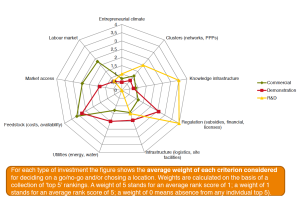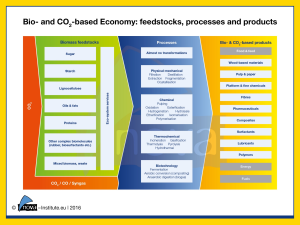Regulatory stability and predictability represent an important basis for investment in almost all industries and sectors. It is particularly crucial for emerging industries and capital intensive sectors, both of which apply to a significant share of bio-based industries. Accordingly, pro-active, forward-looking regulatory approaches and harmonized standardization system can represent important drivers for industry development and investment in emerging sectors, such as bio-based economy.

STAR4BBI aims to establish a coherent, well-coordinated and favourable regulatory / standardisation framework for supporting the development of a cutting-edge bioeconomy for Europe. The main objective of the STAR4BBI project is to promote a level playing field for bio-based products. The focus of the project will be on finding practical ways to modify regulations and standards in such a way that alternative wording, product specifications and/or measuring methods will eliminate hurdles without compromising the initial objectives of the standards or regulations.
The activities being carried out
STAR4BBI conducts a holistic analysis of both the regulatory and the standards framework impacting the bio-based economy in Europe. This ranges from an in-depth analysis of the status quo to a forward-looking and harmonising approach across sectors and value chains. For achieving a bottom-up analysis of specific bio-based value chains in Europe, a foresight study is carried out. The aim is to cover a representative share of the complex and varied aspects of the bio-based economy, as illustrated by the figure right.
As a first step, the consortium carried out a screening of the existing bio-based value chains in Europe and identified the most relevant ones for which key stakeholders were involved. After the analysis of the collected value chains, seven value chains were chosen:
- Poly-lactic acid (PLA) intermediates and foam for construction works based on sugar and starch
- Building blocks for bio-based plastics processed from vegetable oils
- Pine chemicals from wood and forestry by-products
- Succinic acid from starch
- Packaging based on wood and starch derivatives
- Biorefining cellulosic fibres into diverse lignin-based components
- Oleochemical products, mainly metal soaps for industrial applications, especially plastic additives
 Currently, the consortium is working on identifying the market entry barriers. The companies operating in the several parts across the selected value chains will be interviewed to collect data on the hurdles they face to enter and remain competitive in the market. For all value chains, the project focuses on foresight activity on regulations, standards and investment. Technological trends in selected value chains will be analysed and surveys on the supportive regulatory and standardisation frameworks will be carried out to develop proposals for the future supportive and investment-friendly regulatory and standardisation framework for rapid technological changes of the bio-based economy.
Currently, the consortium is working on identifying the market entry barriers. The companies operating in the several parts across the selected value chains will be interviewed to collect data on the hurdles they face to enter and remain competitive in the market. For all value chains, the project focuses on foresight activity on regulations, standards and investment. Technological trends in selected value chains will be analysed and surveys on the supportive regulatory and standardisation frameworks will be carried out to develop proposals for the future supportive and investment-friendly regulatory and standardisation framework for rapid technological changes of the bio-based economy.
In the final phase of the project, concrete suggestions will be made how to integrate the results into standards and regulations and they will be disseminated to decision makers.
A selection of rules and regulatory items that are in most need of removal or that show the best chance for successful adaptation will be selected.
The main achievements
The project will:
- Contribute to a more coherent environmental policy, better interrelations between regional, national, EU and global bioeconomy policies;
- Contribute to the removal of barriers to investments to grow towards a bioeconomy, for example link to waste legislation;
- Produce a regulation action plan to propose amendments to existing regulation or to develop new (European) regulations and links to standards therein, this to promote the factual cooperation of joint projects by actors across sectors and value chains;
- Identify proposals for new (or revised) standards providing increased commonality between different bio-based industrial sectors.
- Develop a commonly agreed vocabulary throughout value chains, from feedstock suppliers to biorefining to downstream actors in the application sectors.
For further information: STAR4BBI Project
STAR4BBI is an EU funded project focusing on Standards and Regulations for the Bio-based Industry. The project started on September 2016 for a duration of 36 months. It is led by the Netherlands Standardisation Institute NEN and comprises of consortium members from the: nova-Institute, TU Berlin and Wageningen University. This project has received funding from the Bio-Based Industries Joint Undertaking under the European Union’s Horizon 2020 research and innovation programme under grant agreement No 720685.
Text by STAR4BBI Project


